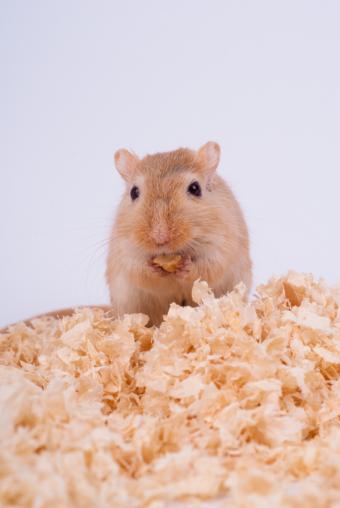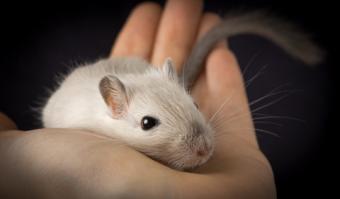
Gerbils are one of the most popular pet rodents, and they can provide a lot of fun and entertainment. These little creatures can live about three to four years as long as you care for them properly. This includes giving them the right kind of home, a healthy diet, some entertainment and affection, and veterinary care as needed. If you can provide all of this, a pet gerbil might be right for you.
Housing Your New Pet Gerbil
Create a safe, healthy habitat for your pet gerbil by following these guidelines.
Gerbil Housing
According to the ASPCA, pet gerbils are best housed in aquariums with a screen tops. These little creatures are great escape artists, so the glass walls are best for keeping them contained, while the screen allows air flow. Place the aquarium where it will get bright indirect light, not full sunshine, and make sure the area is draft free.
Aquarium Size Recommendations
The size of the aquarium you use depends on how many gerbils you keep. A 10-gallon aquarium is the minimum size required for one or two gerbils, but bigger is always better if you have space for it. Plan to increase the aquarium size by five gallons for each additional gerbil after that. This means you would need a 30-gallon aquarium to house six gerbils, and it would need to be the long style aquarium to provide enough floor space.
Gerbil Bedding

Safe bedding includes aspen shavings, recycled newspaper bedding, or a blend of both. Avoid pine and cedar shavings because the fumes can be toxic to your pet.
Cleaning Your Gerbil Cage
Plan to thoroughly clean your pet's environment once a week, but you can spot clean the corner where he leaves his droppings several times a week to reduce buildup and unhealthy fumes. Watch for wet bedding and scoop it out, and then replace it with more dry bedding as needed.
Before you begin a full cleaning, put your gerbil in a safe carrier that closes securely so he can't escape. Use warm, soapy water to wash his aquarium after you dump his dirty bedding in the trash. Wash any dishes and his water bottle as well, and rinse and dry everything before you add fresh bedding to the aquarium. When everything is ready, put your pet back in his home.
Gerbil Habitat Accessories
In your gerbil's habitat, you'll need the following.
- Food dish: This is optional since gerbils tend to scatter food and hide it in their bedding anyway. You can just lay it in a pile on top of the bedding if you wish. If you do use a dish, make sure it's a heavy ceramic dish that will stand up to your pet's constant need to nibble.
- Water bottle: A bottle provides the best way to deliver clean water to your pet. You'll need a chew-resistant bottle that comes with an adjustable metal holder so you can hand it from the side of the aquarium. It should hang low enough for your pet to reach the end of the drinking tube, but not so low that that the tube touches the bedding.
- Exercise wheel: Gerbils are incredibly active, so they need a lot of exercise. A solid wheel spinner is the safest since your pet won't get his feet caught between wires while he runs. It's usually best to hang the wheel from the screen top of his aquarium so it's just an inch or two above his bedding.
- Hide away: Gerbils tend to burrow in their bedding, but they can also benefit from having a wooden nest box. They really like to chew, so it's best to avoid plastic hide aways.
- Chew toys: Gerbils need to chew to keep their teeth from growing too long, so provide items like wooden chew blocks and hay tunnels that will keep him entertained as well.
A Healthy Diet for Gerbils
Gerbils love to eat and will consume just about anything they can get hold of, but it's important to provide them with the right foods in the right amounts to keep them healthy. A single gerbil needs:
- About one tablespoon of gerbil mix a day: This should be a commercial mix, preferably without fatty sunflower seeds, that's blended to offer rounded nutrition. The AGS recommends a mix that provides 12% protein and 7% fat.
- About 1 teaspoon of fresh foods daily: These include organic dark, leafy greens, carrots, and broccoli. You can also give a bit of apple occasionally. Be sure to wash the food before serving.
- Unlimited fresh water: You can use a water dish, but a water bottle really is the best choice. Look for one that has a double ball bearing in the spout to help prevent dripping.
Gerbil Grooming
Gerbils do not need water baths. Instead, give your pet a small bowl of chinchilla bath sand to roll around in. Sand will help exfoliate dead skin and remove excess oils, and it's a better option than dust bath products because dust isn't good for a gerbil's lungs.
Gerbil Health Care and Concerns
Hopefully your gerbil will never need medical care, and keeping his environment clean and his food and water fresh will help ensure he remains healthy. The ASPCA recommends you see a vet if your pet displays any of the following signs.

- Lethargy
- Loss of appetite
- Diarrhea
- Sneezing
- Difficulty breathing
- Unusual swelling or lumps
- Sign of parasite infestation; frequent scratching, head rubbing
Never Lift a Gerbil by the Tail
Gerbils' tails are about as long as their bodies, and though it might be tempting to catch your pet by the tail if you have difficulty catching him, avoid the urge. You can hurt him by doing so. Simply try to cup him in with your hands.
Gerbils With Other Pets
Gerbils are quite social, so it's best for them to have at least one other gerbil to live with. If you want to avoid a population explosion, make sure both are the same sex.
As for mingling with other pets, it's usually best to avoid it. They may fight with other rodents if kept in close quarters, and the stress alone could prove detrimental to their health. It's also best to keep them away from cats and dogs, no matter how trustworthy you think these other pets may be. All it takes is one accident for you to lose your little pet.
Caring for Your Gerbil
Gerbils are sensitive creatures, and changes can stress them out. When you first bring your new pet home, give him three or four days to get used to his environment. Just change his food and water, and perhaps cover his aquarium to help him feel more secure. After this initial period has passed and he seems comfortable in his new environment, you can begin interacting with him. Offer a small piece of his favorite food each time, and you'll be on your way to building a bond that will last his lifetime.







